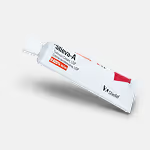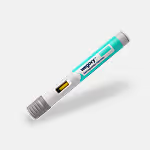Download the Felix App
Earn reward, visit our shop and get exclusive offers on the app
Download nowEarn reward, visit our shop and get exclusive offers on the app
Download nowPut your health first in 2026 with free visits on all categories, and $200 off longevity testing.
Download nowPut your health first in 2026 with free visits on all categories, and $200 off longevity testing.
Download now
AI-generated summaries may be inaccurate and do not constitute medical advice. Third-party AI tools are not under Felix's control, and your use of them is at your own risk.
Menopause brings a wave of change, touching every aspect of your life, from your physical health to your emotional balance. It's a period marked by transition, often filled with questions and uncertainties.
Hormone Therapy (HT) and Hormone Replacement Therapy (HRT) offer a guiding light for many during this time, providing not just relief but also a path forward. As we journey through the details of these therapies in this blog, our aim is to offer clear, comforting insights, enabling you to navigate this phase with knowledge and confidence.
Let's embark on this exploration together, ensuring you feel supported and informed at every turn.
Before we dive into the details, let's break down the terms Hormone Replacement Therapy (HRT) and Hormone Therapy (HT).
Hormone Therapy (HT), which people used to call Hormone Replacement Therapy (HRT), helps ease menopause symptoms by giving the body estrogen and, for those who have a uterus, progesterone.
The term "Menopause Hormone Therapy" (MHT) is now the preferred way to talk about this treatment for menopause symptoms. While "Hormone Replacement Therapy" (HRT) was the original name, it made it sound like these hormones were being added to fix something unusual. But in reality, changes in hormone levels during menopause are normal and expected as part of this phase in life.
That's why we've shifted to calling it Hormone Therapy (HT) or more specifically, Menopause Hormone Therapy (MHT). This name does a better job of explaining what the treatment does: it helps with the symptoms of menopause.
In this blog, we'll use the terms HRT, HT, and MHT in different places, but they all mean the same thing. We're talking about hormone therapy for menopause. MHT is just the newest term that your healthcare provider may use to describe these treatments more accurately.
Think of Hormone Therapy (HT), the modern term for what many know as HRT, as a helper for your body during menopause. It's like giving your body a little boost of the hormones it's missing, which can make you feel a lot better. From the intense heat of hot flashes to the discomfort of vaginal dryness, Menopause Hormone Therapy (MHT) offers a lifeline to those seeking relief. The therapy's benefits extend beyond mere symptom management, touching on aspects of bone health and mood stabilization as well.
Menopause Hormone Therapy (MHT) is a highly effective treatment for menopausal symptoms and has been shown to prevent bone loss. The risks associated with it depend on many factors like the type of hormone therapy, how much you take, how long you're on it, how you take it (for example, a pill or skin patch), when you start it, and if you use progestogen with it. The goal is to tailor the treatment for each person, ensuring you get the most benefit and the least risk.
In considering treatment, there are some risks to be aware of, although they're pretty rare (happening to between 1 in 1,000 and 1 in 10,000 people). These risks include:
In terms of timing, it’s usually best to start MHT before turning 60 or within 10 years of menopause. According to the North American Menopause Society (NAMS), for women younger than 60 or within 10 years of menopause and have no contraindications, the benefits of treating menopause symptoms and preventing bone loss likely outweigh the risks. However, if hormone therapy is started more than 10 years after menopause or after age 60, the benefits might not be as great because of higher risks of heart disease, stroke, blood clots, and dementia.
Because the risks associated with MHT vary depending on individual factors such as age, type of therapy, dosage and personal risk factors, it's important to have a personalized treatment plan. Felix healthcare practitioners can explore options with you to find the balance between treating your symptoms safely, and avoiding increased risks.
"What's the safest option?" is a big question. The answer? It depends on the individual. Your health, your symptoms, and even your family history play a part in finding the best hormone therapy for you.
Transdermal patches, gels, and sprays deliver hormones through the skin directly into the bloodstream, bypassing your liver. This helps minimize some risks associated with oral hormone therapy, such as the risk of blood clots and stroke.
Some people do great with patches or gels, others with pills. It's all about finding what works best for your body. This personalization is crucial for minimizing risks while maximizing therapeutic benefits, ensuring that the chosen therapy aligns with your unique health needs and preferences.
The decision between estrogen-only and combined hormone therapy (estrogen plus progesterone) hinges on whether an individual has undergone a hysterectomy or has an intact uterus.
Estrogen-only therapy is preferable for those without a uterus due to its lower associated risk of breast cancer. However, for those with a uterus, combined therapy with progesterone is essential for mitigating the risk of endometrial cancer.
Everyone's journey is different, so there's no one-size-fits-all answer.
When deciding on Menopausal Hormone Therapy (MHT), your personal and family health history is really important. Things like heart disease, breast cancer, stroke, and blood clots in your family can affect which MHT is best for you. For example, if you or someone in your family has had breast cancer or blood clots, your healthcare provider may suggest a specific type of hormone therapy or may suggest non-hormonal options to manage menopause symptoms.
As well, the timing and duration of hormone therapy play pivotal roles in its safety and effectiveness. Starting MHT early in your menopause journey may lower some risks than if you wait and start it later.
Talking with your healthcare provider about when to start and how long to use hormone therapy is key. They'll help guide you, making sure your plan is tailored to meet your individual needs and make adjustments based on changing health circumstances or responses to treatment. Regular check-ins and open communication with healthcare professionals are key to navigating hormone therapy effectively and safely.
Remember, the path through menopause is not just about enduring but thriving, with every step informed by empathy, understanding, and the collective wisdom of those who've navigated this journey before us. Armed with knowledge and supported by a team of caring professionals at Felix, we can navigate these waters with greater confidence, and move forward with the assurance that our choices are guided by the best of care, tailored to our unique needs.
Medically reviewed by
References



























